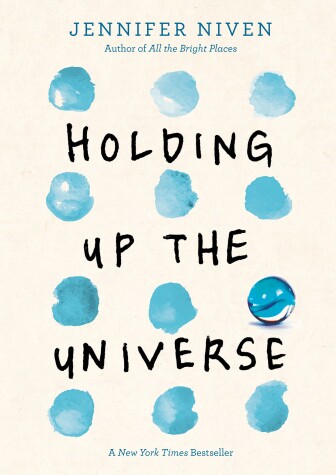Holding Up The Universe was a candid and often confronting storyline of those who have been labelled and ostracised from their peers. It was beautifully written with compassion and conviction for those who aren't what society accepts as perfect, rather than to celebrate our differences.
Libby isn't an overweight girl, she's larger than life. A girl whose health had declined after the death of her mother at the tender age of eleven. She lived a meagre existence by being restricted to the confines of her bedroom, home schooled due to her weight gain and relying on imaginary friendships with the neighbourhood children. Until a health scare sees Libby labelled as America's Fattest Teen and made into a spectacle. Now three years later, Libby has taken control of her health and is determined to enjoy the adolescent experience. Attending school. Meeting new friends. Even falling in love.
Libby Strout is a force to be reckoned with. She's still considered overweight by her peers but she's healthy, she's happy and taken control of her life again. Most importantly, Libby won't allow others to diminish her self confidence, especially not Jack.
Jack is living the ultimate adolescent experience. Although popular and attractive, Jack's life is a facade. Behind the charismatic personality lies a condition in which Jack has self diagnosed a cognitive disorder, where he lacks the ability to recognise familiar faces. Prosopagnosia is a debilitating condition, where sufferers use Identifiers to recognise family and friends such as sounds, physical cues and body shape. So naturally he identifies Libby as the large girl.
Jack can see Libby. He can see her impeccably long eyelashes, her warm, welcoming smile and soon he begins to see Libby beyond her weight. Although I enjoyed the tentative friendship Jack and Libby shared, I was conflicted when it came to the degrading incident that had brought the two together. Jack appeared to be little more than a coward who gave into the cruel game to protect his own reputation. There is absolutely no excuse for cruelty towards others or degradation and I can't imagine that in a non fictional circumstance, the lovely Libby would have been so forgiving.
Most readers will struggle with Jack's character, which I assume is exactly as intended. Jack represents teen pressure and the need to be accepted by our peers. He isn't a malicious person but may be painted as the villain especially for those who have faced the same torment, projecting their own teen oppressors onto that of Jack. Even as an adult, most women still suffer from insecurities and we carry the scars of our teen years that weren't particularly kind. But Jack's character seeks redemption, not willing to excuse his behaviour on his condition but to seek an understanding and acceptance of our differences. Jack isn't perfect and I applaud Jennifer Niven for creating a flawed character among young adult literature which tends to focus on the pursuit of perfection.
Libby is magnificent. I loved her character fiercely for her tenacity and moxie, for her dancing without abandon and her ability to stand up for the injustice in our world, although she's defiant not to become a poster child for fat girls. Although Libby was vulnerable to ridicule, her confidence was inspiring and may empower teens and promote greater self confidence despite our inhibitions and critical natures.
Jennifer Niven is a wonderfully accomplished author, able to invoke emotional responses in readers through realistically flawed characters. Although subjective, Libby's story is not uncommon sadly. Society places a great emphasis on the female body image and often we ourselves are our greatest critics and tend to equate happiness within ourselves with how we are perceived by others.
Life is too short to judge others. It is not our job to tell someone what they feel or who they are. Why not spend some time on yourself instead?
No truer words have been spoken.
